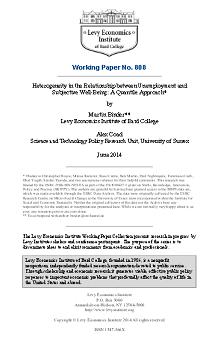Binder, M. & Coad, A. (2014) “Heterogeneity in the Relationship between Unemployment and Subjective Well-Being, A Quantile Approach“, Explorations in Theory and Empirical Analysis, Working Paper No. 808, Levy Economics Institute, June.
Unemployment has been robustly shown to strongly decrease subjective well-being (or “happiness”). In the present paper, we use panel quantile regression techniques in order to analyze to what extent the negative impact of unemployment varies along the subjective well-being distribution. In our analysis of British Household Panel Survey data (1996–2008) we find that, over the quantiles of our subjective well-being variable, individuals with high well-being suffer less from becoming unemployed. A similar but stronger effect of unemployment is found for a broad mental well-being variable (GHQ-12). For happy and mentally stable individuals, it seems their higher well-being acts like a safety net when they become unemployed. We explore these findings by examining the heterogeneous unemployment effects over the quantiles of satisfaction with various life domains.
Relevant posts:
- Gogos, S. & Kosma, O. (2014) “Unemployment Rate in Greece: “The” Long Run Macroeconomic Challenge“, Eurobank Research Team, Economy and Markets, Vol. IX, Issue 6, June.
- Esposito, M. & Tse, T. (2014) “Income Inequality and Youth Unemployment“, Project Syndicate, 25 June.
- Antonopoulos, R. Adam, S., Kim, K., Masterson, T. & Papadimitriou, D. (2014) “Responding to the Unemployment Challenge, a Job Guarantee Proposal for Greece“, Research Project Report, Levy Economics Institute, April.




